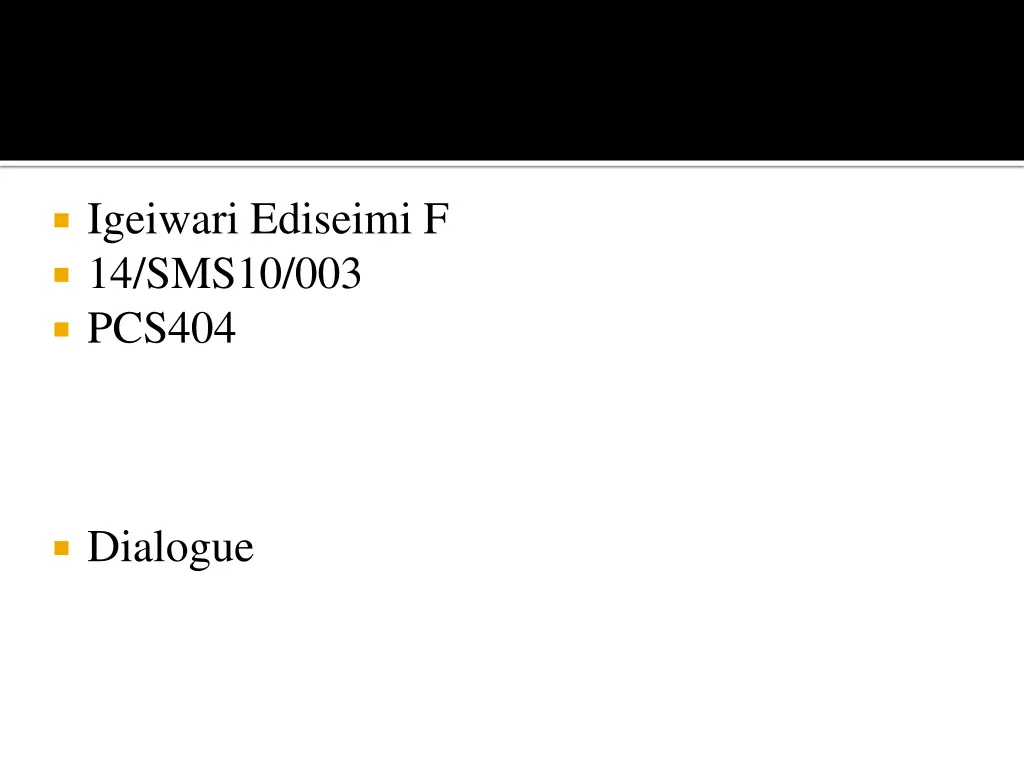
Effective Dialogue: Building Trust, Openness, and Equality
Learn about the importance of dialogue as a form of communication and building relationships. Discover the key principles of trust, openness, honesty, and equality in dialogue. Explore how dialogue can enhance understanding, trust, and collaboration in conflict resolution.
Download Presentation

Please find below an Image/Link to download the presentation.
The content on the website is provided AS IS for your information and personal use only. It may not be sold, licensed, or shared on other websites without obtaining consent from the author. If you encounter any issues during the download, it is possible that the publisher has removed the file from their server.
You are allowed to download the files provided on this website for personal or commercial use, subject to the condition that they are used lawfully. All files are the property of their respective owners.
The content on the website is provided AS IS for your information and personal use only. It may not be sold, licensed, or shared on other websites without obtaining consent from the author.
E N D
Presentation Transcript
Igeiwari Ediseimi F 14/SMS10/003 PCS404 Dialogue
Dialogue is both a kind of conversation and a way of relating. It is a small scale communication process in which participants may say something they have never heard. When conflict become long lasting and involves difference in identities and values, parties tend to cling to their positions and disagree with the views of the opposing party. In order to move toward productive collaboration, parties tend to find new ways of relating with each other that will help them to fully understand the beliefs and fears held by their opponent and themselves. However, before they are willing to sit down to discuss on resolution, parties may be willing to participate in such a conversation (dialogue).
According to Lindgren, dialogue comes from the Greek word, Dia meaning through and Logos meaning word. He defined dialogue as a special form of communication in which participants seek to create greater mutual understanding and deeper insight. As a special form of communication, participants discover new abilities; with the goal Participants are open, they listen to each other and ask question. Participants take into consideration the view points of the other party and figure out what sense they can make in agreement. This gives rise to trust and confidence and increases the degree of contact between the participants which strengthens between them. not resolve the problem. the relationship
There are four basic principles of dialogue: Trust Openness Honesty Equality
Trust: It is easier to express opposing views where there is trust between people in dialogue. Opposite opinions can build distrust in dialogue, however, dialogue help build trust between participants. They listen to each other s speech, ask questions and communicate effectively. Openness: Openness is a way of building trust in dialogue. It is about being honest to what one represent and being open to what others suggest. With openness, parties try to understand each other s point of view without necessarily accepting or agreeing to it. Honesty: Honesty is about real in being who you are, both in words, actions and way of being. Honesty fosters openness and trust, while dishonesty fosters mistrust. Equality: Everyone is equal in dialogue, regardless of the social status, ethnic background gender etc. It is based on the value that everyone has something to say. Dialogue is a means of communication no matter the differences between participants.
It is the way dialogue exists. There are three dimensions: Basic dialogue Values Dialogical frame of mind Dialogical practice
Basic dialogue Values: This involves becoming aware of how dialogue is linked to the mind of participants. Relevant questions to ask include: I what do i believe? What is my view of human nature? For what do i want to use dialogue and why? Dialogical frame of mind: The dialogical frame of mind involves the willingness to be open, exploratory and dialogical towards others even in the face of deep disagreement, because it is difficult to accept the view points of others if they are different from ours. Relevant questions to ask include: do we fight and win? Or do we enter into dialogue and try to understand? Dialogical Practice: This has to do with what participants want to achieve through communication in dialogue and how they want to communicate in practice.
Dialogue Participants do not go into dialogue with the goal of winning, they try to learn. But in discussion, participants Participants in dialogue listen to become wiser, clearly express their views and are tolerant despite the differences between them and it is a win-win situation. Discussion is a complete opposite of dialogue. is different from discussion. want to win.
Destructive Constructive
Destructive: participants do not listen attentively. They prepare for their turn for the next argument. This type of discussion fuels conflict. Constructive: In a dialogical principles of trust, openness, honesty and equality are upheld. People listen with a frame of mind that is open, inquiring and patient enough to digest their own and the other s arguments In a destructive discussion, constructive discussion,
Having principles, it can be used to address dispute in several setting on different issues with the willingness for participants to participate in the process. looked at dialogue, it nature and Lindgren, M. (2012). The Dialogue Handbook- the art of conducting a dialogue and facilitating dialogue workshop. Copenhagen, Dk: DUF- Danish Youth Council
